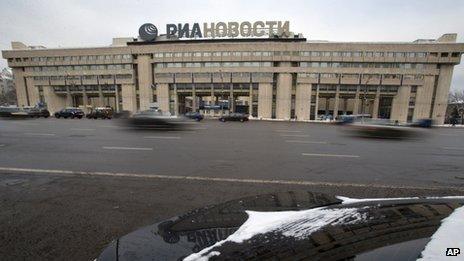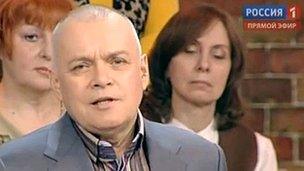Putin's RIA Novosti revamp prompts propaganda fears
- Published

State news agency RIA Novosti has been restructured
President Vladimir Putin's plans to create a major international news agency called Rossiya Segodnya, or Russia Today, is being seen as a significant move in Moscow's strategy to influence world opinion. But it has also raised concerns about further curbs on media freedom in Russia itself.
The new agency is to be headed by Dmitry Kiselev, one of Russian TV's most notorious anchors, known for his extreme anti-Western and homophobic views.
Media stalwarts
Mr Putin's decree liquidating state-owned news agency RIA Novosti and the Kremlin's, external international radio station, Voice of Russia, and replacing them with Russia Today came like a bolt from the blue.
Both RIA Novosti and Voice of Russia have been stalwarts of the media scene for several decades. They were founded way back in the Soviet past, in 1941 and 1929, respectively.
RIA Novosti has been a particularly valued outlet which, although state-owned, has reflected a diversity of opinion in some of its output. Its court reporting service RAPSI also recently won an award for, among other things, its live transmissions of the trial of opposition leader Alexei Navalny.
Pro-Kremlin commentator Sergey Markov, external wrote on Facebook that the agency's demise may be linked to its coverage of anti-Putin protests in 2012 and the apparent sympathy of some of its journalists for the opposition.
Propaganda
Mr Putin's decree states that Russia Today's role will be to transmit to foreign audiences information about the "Russian Federation's state policy and public life in Russia".
It seems likely, therefore, that it will complement the work of the state-funded foreign-language TV station, RT, which when it was launched in 2005 was also known as Russia Today.
The new agency will be a "huge machine for propaganda in the West", tweeted liberal website editor Roman Fedoseyev, external.
The new Russia Today does not appear to be directly connected with its namesake - RT's editor-in-chief Margarita Simonyan, external said on Twitter that she found out about its launch from a Moscow radio station. Still, the choice of name for the new agency can hardly be a coincidence.

Dmitry Kiselev is one of Russian TV's most notorious anchors
Mr Putin has made no secret of his admiration for the work of Ms Simonyan and her colleagues at RT, which since a revamp following the 2008 Russia-Georgia war has become one of the world's most controversial and talked-about international news channels - primarily thanks to its relentless diet of anti-Western reporting on such issues as the conflict in Syria.
During a visit to RT's studios in June, Mr Putin congratulated the staff on their successful efforts to "break the monopoly of Anglo-Saxon media on the world's news".
Earlier, in October 2012, he vetoed finance ministry plans to reduce RT's annual funding of more than $340m (£250m).
'Odious'
The most controversial aspect of Russia Today's launch was the appointment of Mr Kiselev as its director-general.
Known back in the 1990s as one of the faces of "independent journalism", Mr Kiselev has recently become notorious for his extreme and sometimes bizarre diatribes in his role as a top anchor on official channel Rossiya 1.
He has , external, used a Swedish children's TV show about toilet training to exemplify "Western values", and repeatedly demonised homosexuals.
Arguably his most controversial outburst was when he said that Russia's controversial law banning the promotion of homosexuality among children was not tough enough on gays.
"They should be banned from donating blood and sperm, and if they are killed in a car crash their hearts should be buried in the ground or burnt as unfit for helping to prolong anyone's life," he told viewers.
Opposition leader Alexei Navalny , externalnoted ironically on his blog that Mr Kiselev was the "ideal" man to front the "state propaganda machine".
But Anna Kachkayeva, dean of media and communications at Moscow's Higher School of Economics, called his appointment "odious". She also told editorially independent radio station Ekho Moskvy that the launch of the new Russia Today appeared to mark a return to the "Soviet and propagandistic past".
More censorship fears
Mr Kiselev himself told state news channel Rossiya 24 he saw his "mission" in his new job as restoring a "just attitude to Russia as an important country in the world which has good intentions".
The Kremlin has long controlled Russia's leading TV channels (still the main source of news for most Russians), and it has further tightened its control on the media scene with a series of laws passed since Mr Putin began his third term as president in May 2012.
Opposition commentators think the demise of RIA Novosti and its replacement with Russia Today could be another ominous sign for media freedom in Russia.
"We are getting closer and closer to total censorship. They will deal with smaller media even more shamelessly," tweeted Ekho Moskvy presenter Vladimir Varfolomeyev, external.
BBC Monitoring, external reports and analyses news from TV, radio, web and print media around the world. For more reports from BBC Monitoring, click here. You can follow BBC Monitoring on Twitter , externaland Facebook, external.